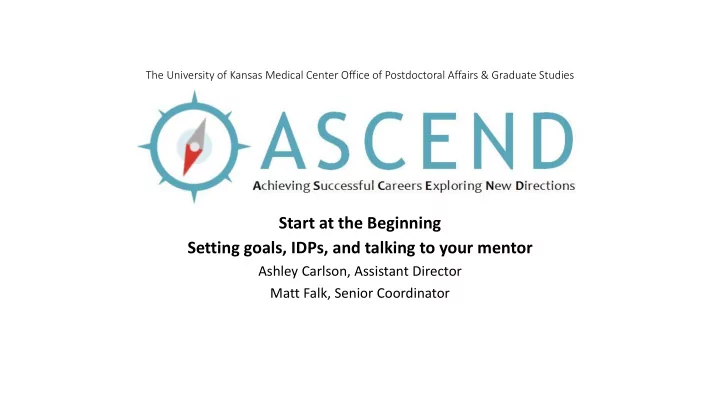

The University of Kansas Medical Center Office of Postdoctoral Affairs & Graduate Studies Start at the Beginning Setting goals, IDPs, and talking to your mentor Ashley Carlson, Assistant Director Matt Falk, Senior Coordinator
The PhD Career Landscape What’s the fuss and why all this planning?
The changing biomed enterprise… • More doctoral degrees are being granted • Fewer tenure-track research faculty positions are available • More biomed trainees are entering into other positions • Institutions have to prepare trainees for this diverse market and more opportunities
A closer look • Number of tenured or tenure-track faculty has decreased • Number of non-tenure faculty has remained steady • Government and industry are largely steady • Growth has been primarily science related non-research positions • Unemployment remains low for biomed PhDs
A New Training Model • NIH BEST encourages career exploration and transferrable skill development • Professional skill building- team work, time management, leadership • The Job Search- resumes & CVs, interviewing, negotiating • Exploration and Experiential Learning- panels, informational interviews, shadowing, externships
Introduction to ASCEND Meet our new program!
Workshop Series • Self-assessment • Career speed dating • Job search and professional networking • Applying • CV & resume writing • Interview skills • Negotiating and accepting
Experiential Learning Placement • Application – Opens in November • Selection process • Contract • Funding • Afterwards
Individual Development Plans How to use an IDP for success now and for future planning
Why IDP? • An IDP is a tool for setting goals and tracking progress • Research shows postdocs who use an IDP publish more and are more satisfied with their careers • IDP has same effect on well-being as a $20,000 raise! • Agencies like NIH and NSF have emphasized IDPs as they focus on quality mentoring of trainees
IDP Models: APA • Self Assessment • Identify interests and motivation, evaluate performance • Explore • Learn about your options and identify what interests you • Examine • Compare options, determine areas that are missing or need development • Set Goals • Plan to improve and build skills • Implement your plan
IDP Models: FASEB For Trainee For Mentor 1. Self Assessment 1. Become familiar with opportunities 2. Survey Opportunities with 2. Discuss opportunities with mentor trainee 3. Write and IDP, review with 3. Review IDP and help revise mentor and revise 4. Implement plan and revise as 4. Establish regular review needed process
IDP Models: AAAS myIDP
IDP Best Practices • Establish IDP within 2-3 months of beginning training/new role • Review with your mentor • Revisit on a regular basis- such as quarterly • Own it! • Set intentions- short, mid, and long term goals • Talk to your mentor- open and direct
Setting Goals Get SMART about setting goals
Setting Goals • Identify goals through • Self-assessment • Exploration • Vision of your future • Consider starting with long term goals, then identify interim goals to get you there • 3 common areas for career related goals • Advancement- exploring options, making connections • Skill Development- learning new skills and developing abilities • Projects- completing specific tasks
SMART Goals 1 2 3 4 5 S M A R T Time-bound Specific Measurable Action Oriented Realistic
SMART Goals: Specific • Define your goal very clearly 1 • Focus in on details, avoid ambiguity S • Try answering the 5 W’s: • Who- who’s involved? Specific • What- what do you want to accomplish? • When- when will you do this, when is it complete? • Where- where will this be done? • Why- why are you doing this?
SMART Goals: Measurable • Make it possible to track progress and know when 1 2 you have achieved the goal S M • Define how much, how many, or what other factors will indicate success Measurable Specific • Consider how you will evaluate progress
SMART Goals: Action Oriented • Define what steps you will take to complete the goal 1 3 • Be specific and clear S A • Break big tasks down Action Oriented Specific
SMART Goals: Realistic • Consider the challenges and obstacles 1 4 • Allow enough time and resources S R • Recognize when a goal is not attainable within these confines Specific Realistic
SMART Goals: Time-bound • Set a deadline! 1 5 • Also set a start date S T • Consider setting incremental check-in points with yourself or a mentor to stay accountable and on track Time-bound Specific
SMART Goals 1 2 3 4 5 S M A R T Time-bound Specific Measurable Action Oriented Realistic
Tips for Achieving Goals • Write it down • Your IDP is a great tool for this • Use a calendar or app • When developing a new skill: train, practice, get feedback • Create a timeline for all your goals
Conversations Sometimes they’re difficult
Difficult Conversation Protocol- Before • Preparation • Documentation • Discuss before acting • Implication • Direct
Difficult Conversation Protocol- During • Introduction • Motive • Description • Impact • Feedback • Agreement • Request • Thank you
Difficult Conversation Protocol- After • Documentation • Research • Meet again
Recap
IDPs • Variety of models to meet your needs • Most include • Self assessment • Goal setting • Good communication with your mentor • Revisit it often
SMART Goals • Specific • Measurable • Action Oriented • Realistic • Time-bound
Difficult Conversation Protocol • Before • During • After
ASCEND is here to help! • One-track model of career planning no longer serves the success or potential of trainees • ASCEND offers comprehensive workshops • Includes experiential learning component for grad students • Save the date: September 12 th - Self Assessments • Help us help you: Online survey, link on the ASCEND website
Questions?
Thank you! Contact Ashley Carlson at acarlson5@kumc.edu with questions or for further help Visit tinyurl.com/KUMCASCEND for upcoming dates and more information Save the date: September 13 th - Self Assessment Tools
Recommend
More recommend